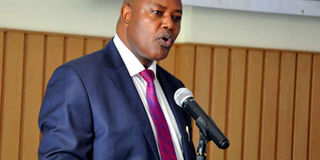George Kinoti roots for special courts to aid in war against graft

Director of Criminal Investigations George Kinoti addresses participants at the International Justice Symposium on February 27, 2018. He has called for the establishment of special courts to enhance efficiency in prosecution of graft cases. PHOTO | FILE | NATION MEDIA GROUP
What you need to know:
- President Uhuru Kenyatta has in recent months revamped the campaign against grand corruption with the new head of DCI and Director of Public Prosecutions Noordin Haji playing a key role.
- Politics and incompetence by investigators have in the past been blamed for the collapse of cases of documented high profile graft situations.
Directorate of Criminal Investigations (DCI) boss George Kinoti now says special courts should be established to speed up prosecution of corruption cases and protect witnesses and evidence.
In an interview with the Nation, Mr Kinoti said that any anti-corruption purge in a democracy was a vicious war involving entrenched and influential interests determined to fight back.
“This calls for special and extraordinary measures, including special courts and personnel to dispense with them quickly and continuously. Otherwise, the normal court diary will soon be overwhelmed leading to delays and opportunities to compromise evidence and witnesses,” he said.
President Uhuru Kenyatta has in recent months revamped the campaign against grand corruption with the new head of DCI and Director of Public Prosecutions Noordin Haji playing a key role.
The government latest purge on grand corruption has seen tens of public officials arrested, charged in court and some bank accounts frozen in a move that has raised cautious expectations More arrests and prosecutions are expected in additional investigations in the pipeline.
SENT TREMORS
A shake up at the offices of the Attorney-General and Solicitor General and the twin directorates of Public and Criminal Investigations, have sent tremors across the political terrain. To wit, the investigations have roped in the National Intelligence Services.
AG Paul Kihara chose an East African Professional Societies of East Africa event two weeks ago to make an all-too-familiar promise:
“ Under my watch, we shall overcome corruption” he said. Mr Kinoti, whose docket has in the past been accused of building weak cases doomed to collapse under scrutiny in court, said he had been more diligent in his homework this time round: “The time for hoodwinking Kenyans with poorly prepared files is over.”
However, Mr Kinoti, a staunch Catholic who adorns his office with prominently placed crucifixes and rosaries, said extraordinary times call for extraordinary measures and the judiciary needed to do more to support other agencies.
“We are suddenly dealing with hundreds of high-profile cases that may overwhelm the normal court diary. There is an urgent need for special courts dedicated to these cases so as to achieve quick justice for the public and the suspects,” he said. Mr Kinoti said corruption was not an ordinary crime, and those involved had influential networks, financial muscle and political power.
NORMAL COURT DIARY
“If these cases are processed under the normal court diary, they will drag on for a long time, giving the networks and cartels possible opportunities to contaminate the civil servants involved, including judicial officers, tamper with evidence and witnesses. We have special benches for election petitions, this request is not too high a price to pay for speedy resolution of corruption cases,” he said.
Politics and incompetence by investigators have in the past been blamed for the collapse of cases of documented high profile graft situations.
Greater danger and risk against the latest state-driven purge on grand corruption lurked from disconnect between inter-agency cooperation, that undermined the resolve and momentum against the cartels that were also fighting back, Kinoti said.
This week, President Kenyatta provided new impetus to the fight against corruption when he, together with his Swiss counterpart Alain Berset, witnessed the signing of the latest mutual legal assistance agreement in Nairobi.
STOLEN PUBLIC RESOURCES
The assets recovery agreement signed by Kenya Attorney General, Mr Kihara Kariuki and his Swiss counterpart, Mr Ralf Heckner, paves the way for commencement of tracing, identification and repatriation of stolen public resources stashed in cash and physical assets in foreign lands.
The Nation has learnt that a raft of new Mutual Legal Assistance agreements had been signed and new ones lined up with a cross section of jurisdictions including Dubai and Morocco, targeting individuals and companies involved in past cases and current ones including suspect sugar and fertiliser imports.



